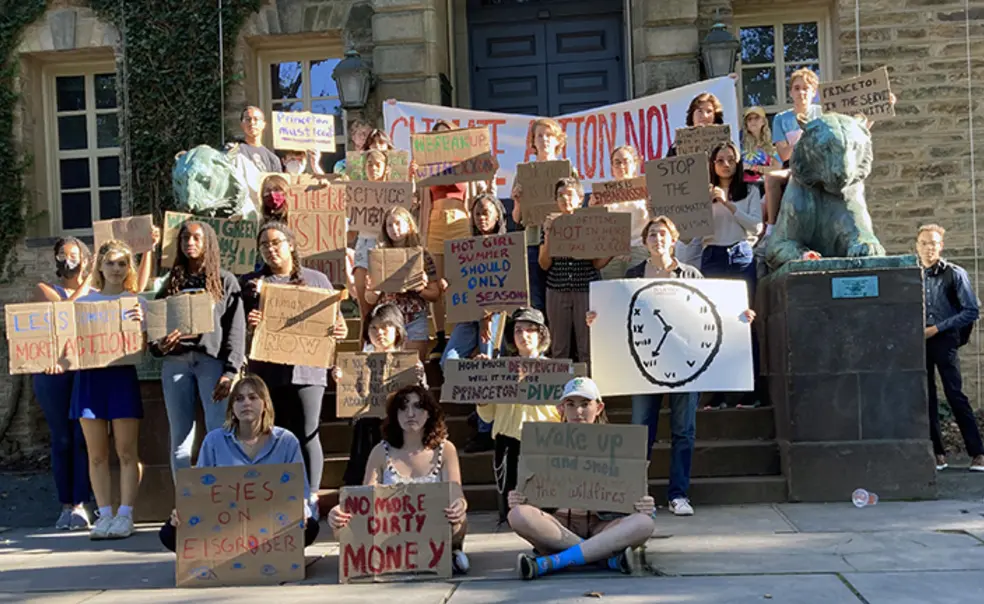Students at Sit-in Protest Princeton’s Investment in Fossil Fuels
‘We want to see meaningful change,’ said Martin Mastnak ’25
Princeton undergraduates, graduate students, high school students, and community members trickled in and out of a Divest Princeton “sit-in” outside Nassau Hall on Friday afternoon, Sept. 24.
The protest included speeches, poetry readings, and chants. Students made and displayed signs with slogans such as “Hot Girl Summer Should Only Be Seasonal,” and played songs over speakers, including “We Didn’t Start the Fire” and “Imagine.” The number of protestors fluctuated over the course of the protest, from just a handful at the start to as many as 50.
“We want to see meaningful change,” said Martin Mastnak ’25, who spoke at the sit-in. “We want to see immediate divestment from fossil fuels.”
In May, the University announced that it would dissociate from “companies engaged in climate disinformation” and companies that are involved with tar sands or thermal coal.
Many at the sit-in felt that this action did not go far enough, particularly in the wake of Harvard’s announcement in early September that it would not make any new investments from its endowment into the fossil fuel industry and would let its current investments expire.
“The most contradictory thing is the motto,” said Meera Kochhar ’25, referencing Princeton’s unofficial motto, “in the nation’s service and the service of humanity.” She said that continued investment and association with the fossil fuel industry feels hypocritical.
Vice President Hilary A. Parker ’01 presented information about the dissociation process to students and community members at the Sept. 20 meeting of the Council of the Princeton University Community. Princeton assembled a faculty panel to help establish standards for dissociation, which will submit a report to an administrative committee that will then propose a plan for dissociation.
The faculty-panel members will draw on their own and others’ expertise to provide findings to help measure the spread of climate disinformation, for example, or participation in the thermal coal or tar sands sectors.
The board of trustees and the faculty panel have had “very minimal transparency,” said Hannah Reynolds ’22, a coordinator for Divest Princeton. “We have no idea to what extent they’re going to be divesting.” Reynolds also voiced concerns that some of the professors sitting on the faculty panel receive funding for research from fossil fuel companies, and that this might represent a conflict of interest.
“The faculty panel is charged with providing impartial scholarly advice on standards and metrics that can be used to implement the dissociation decision made by the Board in the spring,” University spokesman Michael Hotchkiss told PAW via email. “The panel will not be making decisions about any individual companies. Engagement with fossil fuel companies is not in and of itself negative or contrary to the goals of this process.”
The faculty panel has been charged with submitting a public written report of its findings by the end of the academic year.












1 Response
Jeffrey Marshall ’71
4 Years AgoFossil Fuel Sit-in: Challenge for Trustees
I read with interest the item about the sit-in to call for Princeton to divest itself of all investments in fossil fuels (published online, Sept. 30). In my day on campus, the target was South Africa and its then-despicable apartheid regime.
The fossil-fuel complex is a much tougher target, I’d imagine, in part because many mutual funds include stocks of the major oil companies. While I have no idea of the extent of Princeton’s investments in such funds, it would seem to involve considerable complexity to make decisions on shedding them.
The presence of high school students at the campus sit-in caught my attention. The youngest generation seems to be particularly concerned about climate change — after all, it is a changed world they will inherit; even young Republicans polled cite climate change as a major issue.
As an environmentalist and nonprofit board member heavily invested in conservation, I’m a confirmed foe of fossil-fuel industries — especially mining. It’s encouraging that Princeton has already committed to divesting itself from companies involved in thermal coal or tar sands, two especially noxious technologies.
While the impact of sit-ins at elite universities may be debatable in the short term, they’re something of a canary in a coal mine (an appropriate analogy). It will be intriguing to see what the faculty panel charged with issuing a report comes up with.